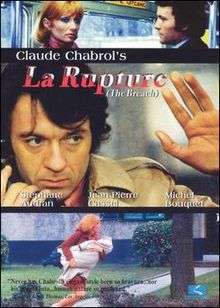The Breach (film)
| The Breach | |
|---|---|
 DVD cover | |
| La Rupture | |
| Directed by | Claude Chabrol |
| Screenplay by | Claude Chabrol |
| Based on |
The Balloon Man by Charlotte Armstrong |
| Starring |
Stéphane Audran Jean-Pierre Cassel Michel Bouquet Annie Cordy |
| Music by | Pierre Jansen |
| Cinematography | Jean Rabier |
| Edited by | Jacques Gaillard |
| Distributed by |
Gaumont Film Company New Line Cinema |
Release date |
|
Running time | 111 minutes |
| Country |
France Italy Belgium |
| Language | French |
| Box office | $5,566,068[1] |
The Breach (French: "La Rupture") is a 1970 film written and directed by Claude Chabrol, based on the novel The Balloon Man by Charlotte Armstrong. The film was also known as The Breakup at times in its release in the United States.[2] The film had a total of 927,678 admissions in France.[3]
Plot
Hélène Régnier's (Audran) mentally ill husband Charles (Drouot) injures their son Michel in a violent rage. Charles is then forced to move back in with his wealthy and manipulative parents, who use Hélène as a scapegoat for their son's mental state and decide to take over custody of Michel by any means necessary. While the boy is recovering in a local hospital, Hélène moves to a boarding house nearby. The Régniers hire Paul Thomas (Cassel), an impoverished family acquaintance, to find out something about Hélène which would help them in their custody battle. Paul moves into the boarding house and, with the help of his girlfriend Sonia (Rouvel), plots to ruin Hélène's reputation and then possibly kill her.
Principal cast
| Actor | Role |
|---|---|
| Stéphane Audran | Hélène Régnier |
| Jean-Pierre Cassel | Paul Thomas |
| Michel Bouquet | Ludovic Régnier |
| Annie Cordy | Mme. Pinelli |
| Jean-Claude Drouot | Charles Régnier |
| Jean Carmet | Henri Pinelli |
| Catherine Rouvel | Sonia |
| Claude Chabrol | Un passager dans le tramway |
Critical reception
Vincent Canby of The New York Times:
| “ | La Rupture, with a screenplay adapted by Chabrol from a novel by Charlotte Armstrong, has so many beautiful things in it that I'm tempted to suspect some terrible weakness in myself, rather than the film, for the feeling of depressed impatience it left. Perhaps not... There is also another problem with the frame of the film: the disadvantages and indignities are piled so thickly on the poor heroine that one knows early that the film is obliged to offer her vindication. Otherwise it has no shape. That her vindication is achieved at a high price isn't surprising or touching enough to transform the melodrama of La Rupture into tragedy.[4] | ” |
Dave Kerr of The Chicago Reader:
| “ | One of the key films of the 70s, La Rupture is Claude Chabrol's most audacious experiment with narrative form — a modernist reworking of the melodrama (1970)... The “rupture” of the title belongs to the narrative, which begins with clear black/white, good/evil distinctions and then gradually self-destructs, breaking down into increasingly elliptical and imponderable fragments. Highly recommended.[5] | ” |
References
- ↑ "La Rupture (1970)- JPBox-Office". Retrieved 28 May 2015.
- ↑ "La Rupture (The Break Up) (The Breach) (Hallucination)". Rotten Tomatoes. Retrieved 2011-08-23.
- ↑ JP (1970-08-13). "La Rupture (1970)". JPBox-Office. Retrieved 2011-09-03.
- ↑ Canby, Vincent (1973-10-05). "Movie Review - La Rupture". Movies.nytimes.com. Retrieved 2011-08-23.
- ↑ Kehr, Dave. "La rupture". Chicago Reader. Retrieved 2011-08-23.
External links
- The Breach on IMDb
- The Breach at AllMovie